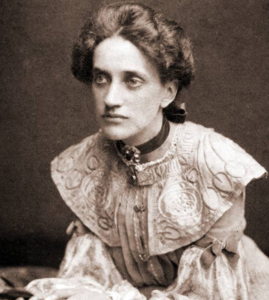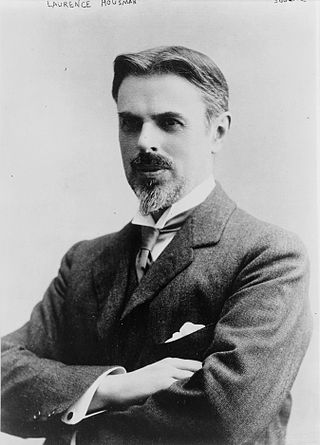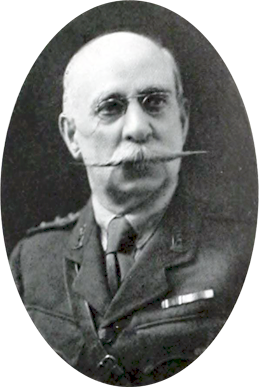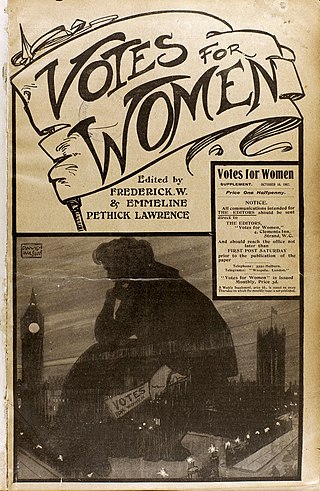
Ann Macbeth was a British embroiderer, designer, teacher and author, a member of the Glasgow Movement and an associate of Charles Rennie Mackintosh. She was also an active suffragette and designed banners for suffragists and suffragettes movements.

Laurence Housman was an English playwright, writer and illustrator whose career stretched from the 1890s to the 1950s. He studied art in London and worked largely as an illustrator during the first years of his career, before shifting focus to writing. He was a younger brother of the poet A. E. Housman and his sister and fellow activist in the women's suffrage movement was writer/illustrator Clemence Housman.

Marion Wallace Dunlop was a Scottish artist, author and illustrator of children's books, and Suffragette. She was the first and one of the most well known British suffrage activists to go on hunger strike on 5 July 1909, after being arrested in July 1909 for militancy. She said she would not take any food unless she was treated as a political prisoner instead of as a common criminal. Wallace Dunlop's mode of protest influenced suffragettes after her and other leaders like M. K. Gandhi and James Connolly, who also used fasting to protest British rule. She was at the centre of the Women's Social and Political Union and designed some of the most influential processions of the UK suffrage campaign, as well as designing banners for them.

A movement to fight for women's right to vote in the United Kingdom finally succeeded through acts of Parliament in 1918 and 1928. It became a national movement in the Victorian era. Women were not explicitly banned from voting in Great Britain until the Reform Act 1832 and the Municipal Corporations Act 1835. In 1872 the fight for women's suffrage became a national movement with the formation of the National Society for Women's Suffrage and later the more influential National Union of Women's Suffrage Societies (NUWSS). As well as in England, women's suffrage movements in Wales, Scotland and other parts of the United Kingdom gained momentum. The movements shifted sentiments in favour of woman suffrage by 1906. It was at this point that the militant campaign began with the formation of the Women's Social and Political Union (WSPU).

Founded in 1854 as the Lambeth School of Art, the City and Guilds of London Art School is a small specialist art college located in central London, England. Originally founded as a government art school, it is now an independent, not-for-profit charity, and is one of the country's longest established art schools. It offers courses ranging from art and design Foundation, through to BA (Hons) undergraduate degrees and MA postgraduate courses in fine art, carving, conservation, and art histories. In addition, it offers the only undergraduate and postgraduate degrees in Britain in stone and wood carving: historic architectural stone and ornamental woodcarving and gilding.

Edith Margaret Garrud was a British martial artist, suffragist and playwright. She was the first British female teacher of jujutsu and one of the first female martial arts instructors in the western world.
Housman is a surname. Notable people with the surname include:1553

Clemence Annie Housman was an author, illustrator and activist in the women's suffrage movement. She was the sister of A. E. Housman and Laurence Housman. Her novels included The Were-Wolf, Unknown Sea and The Life of Sir Aglovale De Galis. She was also a leading figure in the suffragette movement.

Alfred Pearse, also known as A Patriot, was an English artist, author, campaigner and inventor. Pearse, born at St Pancras, London, was a fourth generation artist and son of celebrated decorative artist Joseph Salter Pearse (1822–1896) and Loveday Colbron (1825–1895). He studied at West London School of Art and gained numerous prizes for drawing.

Gude Cause was the name of a feminist project, based at the Peace and Justice Centre in Edinburgh, Scotland, which inspired over 60 events and projects throughout Scotland between 2007 and 2009.

The Actresses' Franchise League was a women's suffrage organisation, mainly active in England.

Edith Elizabeth Downing was a British artist, sculptor and suffragette.

Votes for Women was a newspaper associated with the women's suffrage movement in the United Kingdom. Until 1912, it was the official newspaper of the Women's Social and Political Union, the leading suffragette organisation. Subsequently, it continued with a smaller circulation, at first independently, and then as the publication of the United Suffragists.

Frances Mary McPhun (1880–1940) was a Scottish suffragette who served two months in Holloway prison, and had organised events and processions for women's suffrage in Edinburgh.

Louise Mary Eates was a British suffragette, chair of Kensington Women's Social and Political Union and a women's education activist.
Irene Dallas and Hilda Dallas (1878–1958) were British suffragette sisters: Hilda, an artist, designed publicity material, Irene, a protester was imprisoned for political reasons, and both sisters also boycotted the 1911 Census.

The WSPU Holloway Banner is a suffragette banner designed by Scottish artist Ann Macbeth.

Hilda Mary Dallas (1878–1958) was a British artist and a suffragette who designed suffrage posters and cards and took a leadership role for the Women's Social and Political Union (WSPU). A pacifist, she raised funds from a cross-section of society, produced and designed set & costumes for the 1929 Court Theatre production of the anti-war satirical play The Rumour.
Elizabeth Ellen (Beth) Hesmondhalgh, active 1907 –1914, began working around 1885 as a cotton spinner in Preston, and became a British suffragette, imprisoned twice for militant protesting on behalf of women's franchise, and awarded the Women's Social and Political Union (WSPU) Hunger Strike Medal for valour.


















